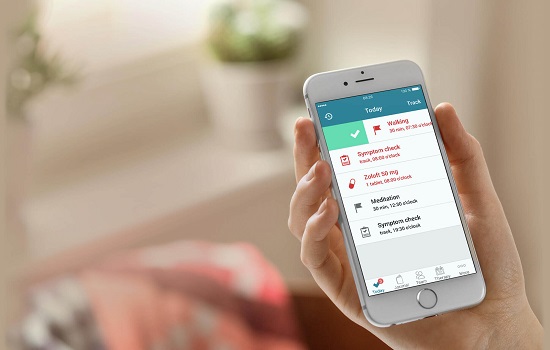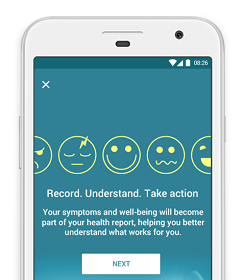Free Your Mind: How an App Can Help You Manage and Treat Your Depression
With Effective Medication Management and Sticking to Your Treatment Plan, You Can Fight and Overcome Depression. Use MyTherapy to Help You Get Better.

Sadness, feeling down, or losing interest in daily activities happen to all of us now and again. However, if these kinds of feelings persist, intensify, and severely impact your daily life, then it is possible that you have depression. The World Health Organization (WHO) estimates that 350 million people are affected by depression globally. The good news is that depression is one of the more treatable mental disorders. There are numerous treatment options available, including medication, therapy, and mindfulness techniques. However, seeing as depression affects your ability to function, it may be challenging in the initial stages of treatment to feel motivated to attend therapy sessions or remember to take your medication. This is where smartphone apps, like MyTherapy, can help you manage these important aspects of your treatment and help you recover and improve your quality of life as soon as possible.
There are typically three components to the effective management of depression. These include support (from friends, family, and professionals), psychotherapy (like cognitive behavioral therapy), and medication (specifically antidepressants). MyTherapy comes with a variety of practical features to help you cope with and manage your depression. If you have been prescribed medication, then you can use the app's medication reminders to remind you when and how to take your medication as per prescribed instructions from your doctor. These reminders can also be used for any appointments too. You can choose your alarm tone or even set it to vibrate or silent. The app will also continue to remind you to take your medication until you click the confirm button. To upload your medication, all you need to do is scan the barcode on the medication packaging with the app's built-in barcode scanner, search in the app's database, or do so manually. Once you've logged everything you need to, the app will take care of the rest and break everything down for you into an easy to-do check-list.
The app also features a digital health diary, which you can use to track your symptoms, moods, and general well-being. Tracking your symptoms and moods is an important part of managing your depression, as this can show you and your doctor how you are progressing with treatment and if you are getting better. You can also use the diary to set daily exercise goals, which is also useful in the treatment of depression.
Then, at the end of each month, you have the option to receive a health report compiled into graphs. This report is based on all your logged data and can be shared with your doctor. This will give him/her an overview of how you are doing and can help him/her decide if your treatment plan needs adjusting.
This health diary is therefore an effective tool to help you and your doctor/therapist monitor your episodes of depression and personalize the therapy to meet your specific needs. And if you'd like some extra privacy, you can set a passcode on the app so that no one else has access to it but you.
The app is also subject to constant development through user feedback, ensuring that it is consistently being improved upon to meet your needs. It is easy to use and understand and is therefore suitable for anyone of any age.
Depression affects thoughts, feelings and behaviour
Depression, also referred to as major depressive disorder or clinical depression, is a common but serious mood disorder. It is a form of intense sadness, including feelings of hopelessness, worthlessness, and helplessness. It can last for weeks, months, or years. It affects your ability to cope with everyday life by severely impacting on thoughts, feelings, and behavior.
There are many different symptoms of depression
There are many different symptoms of depression that vary between people. The DSM-5, a manual for diagnosing mental illnesses, specifies criteria for the diagnosis of depression. They can be divided into psychological, physical and social symptoms.
Psychological symptoms
- Low mood and intense feelings of sadness
- Feeling hopeless, worthless, helpless, and guilty
- Loss of pleasure or interest in life
- Suicidal thoughts
- Being indecisive, anxious, or worried
- Increased irritability and intolerance of others
- Thoughts of self-harm, suicide, and death
Physical symptoms
- Change in appetite or weight (weight loss or gain)
- Slowed movement and speech
- Change in sleeping habits (sleep more or less than usual)
- Unexplained aches and pain
- Disturbed menstrual cycle
- Constipation
- Lack of interest in or energy for sex
Social symptoms
- Decreased performance at work
- Avoiding social activities, withdrawing from friends and family
- Neglecting hobbies and interests
- Struggling with home and family life
Not everyone who is depressed will experience every symptom. The severity and frequency of symptoms differs from person to person.
Types
There are different types of depression and some of these include:
- Unipolar and bipolar. The difference between the two is that unipolar is only characterized by depressive phases; whereas bipolar disorder (previously known as manic depression) is characterized by both manic (elevated moods) and depressive episodes.
- Persistent depressive disorder (dysthymia). This is a depressed mood that lasts for a minimum of two years.
- Major depressive disorder with psychotic features. This condition is characterized by depression with psychosis, which involves delusions or hallucinations.
- Postpartum depression. This is depression experienced by a woman either during pregnancy or after delivery.
sonal pattern. This condition is related to the reduced daylight of winter.
To diagnose clinical depression, the symptoms should last for at least two weeks and impair a person’s daily functioning. They must cause significant distress and cannot be due to effects of drugs, medication, or other medical conditions, such as hypothyroidism. If you are worried that you may have depression, you can take an online self-assessment test or visit your GP. The Hamilton depression rating scale is one of the most widely used assessments used by healthcare professionals to diagnose depression. Depression is the leading psychological disorder in the Western world. One in five people become depressed at some point during their lives, with women being more affected than men.
There are several risk factors for depression
There is no single cause for depression. It is likely caused by a combination of factors, including:
- Genetics: family, twin, and adoption studies indicate genetic factors contribute to one's susceptibility to depression, with heritability estimated to be between 40-50%.
- Biological, where there are changes in neurotransmitter levels
- Environmental
- Psychological or social
Some people are also at a higher risk of depression. These risk factors include:
- Life events. Stressful life events, such as the death of a loved one, break-ups or divorce, financial problems, or continuous exposure to violence, neglect, abuse, or poverty, all increase the chance of depression for some people.
- Personality. People with low self-esteem or low ability to cope with stress are more prone to developing depressive symptoms.
- Childhood trauma
- Abuse of recreational drugs (including alcohol)
- A past head injury
Most people improve with treatment
Depression is one of the most treatable mental disorders. The most effective and popular treatments include medication and psychotherapy.
Antidepressants are a type of medication used to treat depression. They work by increasing the level of certain brain chemicals (so-called neurotransmitters). They usually target the neurotransmitters serotonin and noradrenaline. The most widely used antidepressants are selective serotonin reuptake inhibitors (SSRIs). However, some people may respond better to serotonin-noradrenaline reuptake inhibitors (SNRIs) and noradrenaline and specific serotonergic antidepressants (NASSAs). SSRIs that are approved to treat depression include citalopram, escitalopram, fluoxetine, paroxetine, sertraline, and vilazodone. SNRIs approved to treat depression include desvenlafaxine, duloxetine, levomilnacipran, and venlafaxine.
Psychotherapy, such as cognitive behavioral therapy (CBT) or interpersonal therapy, is an alternative form to treat depression. CBT focuses on recognizing and changing distorted thinking and the behavior resulting from it. It is often the first line of treatment for mild depression. People with moderate or severe depression are often treated with a combination of CBT and antidepressants. Apart from medication, there is also evidence that brain stimulation techniques (like electroconvulsive therapy) can help with depression.
There are also other things you can do to help you manage your depression. These include:
- Exercise and staying active
- Goal-setting
- Spending time with loved ones
- Talking about how you are feeling
- Educating yourself on depression
The MyTherapy app frees your mind from depression
Depression can be debilitating without treatment and its accompanying symptoms, such as lack of motivation, fatigue, and anxious mood, can interfere with medication adherence and health monitoring. For this reason, smartpatient developed the app MyTherapy, which can offer you valuable support in fighting depression. The medication reminder feature makes medication adherence a simple to-do task and the comprehensive health journal helps you with symptom and mood tracking. With the monthly health report, you can also work closely with your doctor/therapist to see how you are progressing and make adjustments to your treatment plan if necessary. Fight depression and have some much-needed peace of mind with MyTherapy today.


